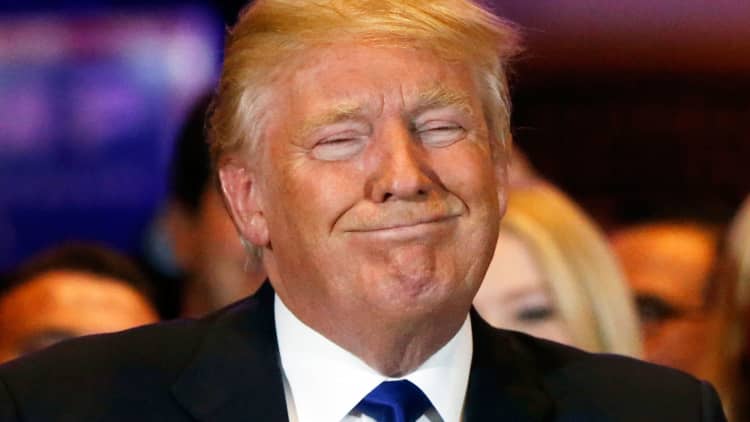In March speeches to the American Israel Public Affairs Committee, Donald Trump and Hillary Clinton tried to pacify fears about their commitment to the Jewish State.
Trump, now the presumptive Republican presidential nominee, said he would ensure that Palestinians enter any peace negotiations "knowing that the bond between the United States and Israel is absolutely, totally unbreakable." Clinton, his likely Democratic opponent in November, said "we will never allow Israel's adversaries to think a wedge can be driven between us."
But the candidates' past statements leave some in the Middle Eastern country questioning those pledges. While experts said Israelis get some entertainment value from the insult-ridden U.S. presidential contest, they mainly follow it to gauge one key question: Who will be better for Israel?
The answer varies — of course — among members of the general public and political elite. But experts in the country who spoke to CNBC said that many Israelis view the contest as a choice between a predictable option in Clinton, the former secretary of state, and an unknown variable in Trump, an abrasive businessman who has not held elected office.
"With Hillary, she's a safe pair of hands. She has a good knowledge of the region, she has a good knowledge of the players. There's a difficulty to understand what Trump is all about," said Jonathan Rynhold, a professor at Bar-Ilan University in Israel and expert in Israeli foreign policy.

The 2016 election follows tense relations between Democratic President Barack Obama and the right-wing government of Israeli Prime Minister Benjamin Netanyahu. Israel's ongoing conflict with the Palestinians, the rise of the so-called Islamic State in Iraq and Syria, and the Obama administration's handling of sanctions and a nuclear deal with Iran all present challenges to Obama's successor.
Perceptions of who will better protect Israel have so far varied. Sixty-two percent of Israeli Jews said Trump will be "committed to safeguarding Israel's security," the Israel Democracy Institute's April Peace Index found. Only 48 percent of respondents agreed that Clinton would "block any attempt to attack or isolate Israel."
However, the same survey found that 40 percent think Clinton's election would be better for Israel, compared with 31 percent in favor of Trump.
It is the devil we know or the devil we don't know. That is basically the question everyone is asking themselves.Ron Schleifersenior lecturer, Ariel University
Other data suggest Israelis would prefer either Clinton or Trump over Obama. The president has angered many within the Israeli government for taking a more hands-off approach from Israel and for supporting an end to sanctions on Iran in exchange for a freeze in its nuclear program.
Fifty-one percent of respondents to an April survey for Israel's Channel 1 said they felt any of the current U.S. candidates would be better than Obama for Israel, while 26 percent said there would be no change. The poll also found that Israelis are more likely to feel that Trump would have a better relationship with Netanyahu than Clinton would.
Still, Trump's inconsistent statements make him an unknown quantity in many Israelis' minds, and that works in Clinton's favor. He has previously said, for instance, that he would take a "neutral" stance in peace negotiations between Israel and the Palestinians.
"It is the devil we know or the devil we don't know. That is basically the question everyone is asking themselves," said Ron Schleifer, a senior lecturer at Ariel University.
Trump also said in April that U.S. allies have not paid "their fair share" for security, a statement that could perturb Israel, considering it receives more U.S. military aid than any other country.
Some doubts also surround Clinton, despite her hawkish, pro-Israel rhetoric — after all, she served as Obama's secretary of state from 2009 to 2013.
But many within Israel associate her less with Obama and more with her husband, former President Bill Clinton, said Ronen Bergman, a senior correspondent for military and intelligence at Israeli newspaper Yedioth Ahronoth. Bill Clinton remains popular there.
"If he would go and run for the prime minister of Israel today, he might be winning," Bergman said.
Though she served under Obama, Hillary Clinton's tenure as secretary of state also lends her some authority in Israel.
"Hillary has a lot of experience. She knows the Middle East," said Anat Berko, a member of the Israeli Knesset, or parliament, in Netanyahu's conservative Likud Party.
Berko, who was recently appointed head of the subcommittee of intelligence and secret services, did not speculate on whom Likud may prefer in the election. Others said perception among the political elite depends on ideology, with those leaning more to the right feeling more favorable to Trump than other Israelis are.
The Israeli prime minister's office declined to comment.
The leanings of pro-Israel Americans add another wrinkle to the story. Billionaire casino titan Sheldon Adelson has said he will support Trump, while media mogul Haim Saban has already given millions of dollars in support of Clinton.
Adelson also owns the Israel Today newspaper. Bergman of Yedioth Ahronoth said he has seen a shift in how the outlet covers Trump, noting it treats him "as a more serious and legitimate candidate" than it did before Adelson backed the New York business tycoon.





